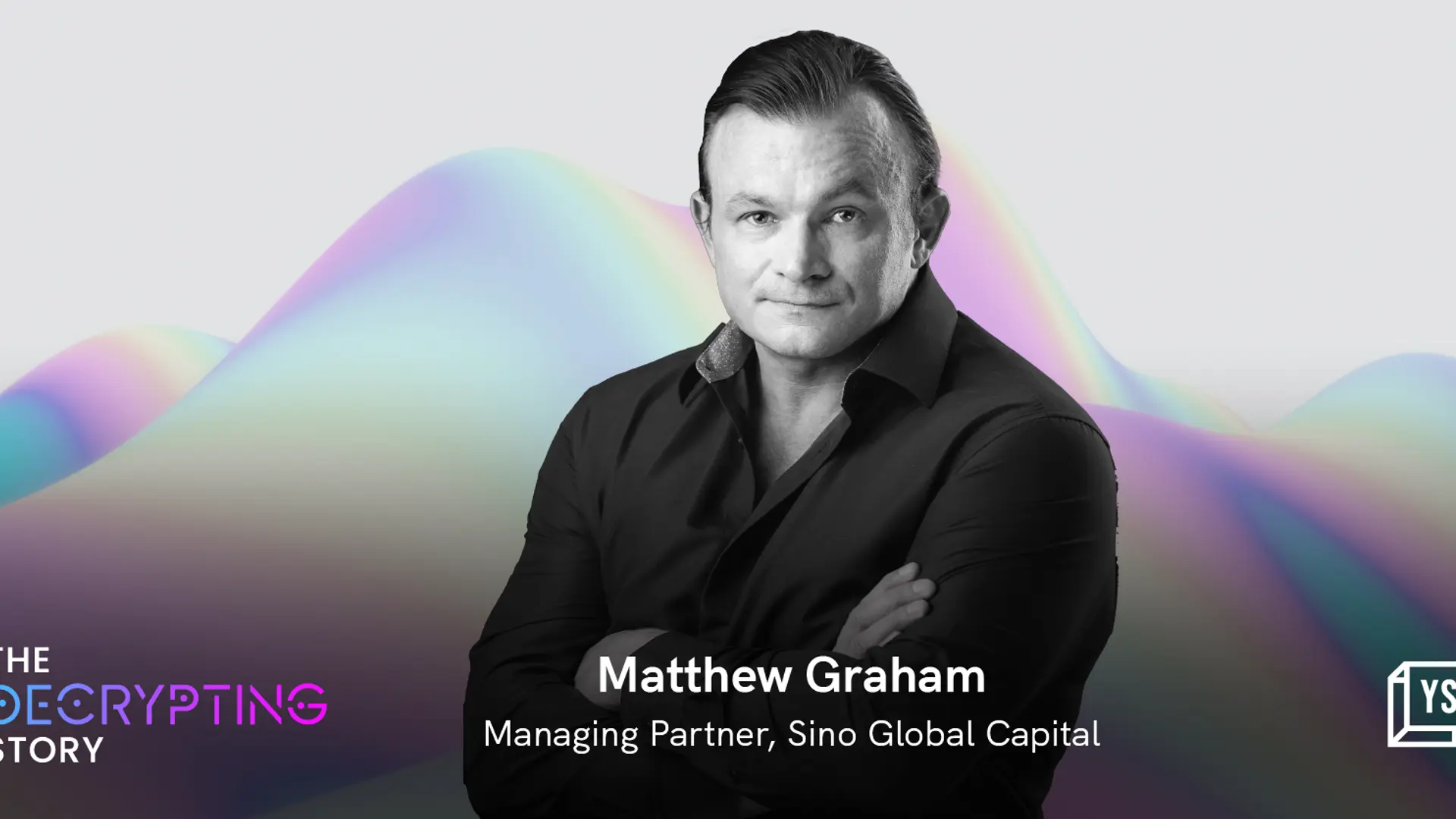Crypto ‘kingmaker’ Matthew Graham on how Sino Global Capital is tapping into the Indian Web3 market
In a conversation with The Decrypting Story, Matthew Graham, Managing Director, Sino Global Capital, talks about investing in Web3 startups in India.
All Matthew Graham, Managing Director of Sino Global Capital (SGC), likes is change. As a fintech banker, Matthew represented international technology companies in emerging markets for strategic partnerships and acquisitions.
“The reason I work in emerging markets, by the way, is because I’ve always been fascinated by agents of change. I always wanted to be where the action is, right in that engine of change. I’m fascinated by learning new things and learning about new cultures. So I opened my own shop SGC in 2015,” says Matthew in a conversation with The Decrypting Story, while on a visit to Bengaluru.
One of the key investors in the crypto space, Matthew has also been called the ‘kingmaker’ in the blockchain and Web3 space. He, in fact, has been an early investor in FTX, Polygon, and more recently, EPNS.
Many founders of these companies swear by him, and believe that the vision and drive Matthew brings also helps the companies and products grow. In October last year, along with FTX, Sino started a $200 million FTX fund.
While both and have invested together a few times, with time, Sino thought of institutionalising this investment process.
“We have such a great working relationship with them (FTX). It was also because their process, values, and agency aligned with ours. There's also enormous strategic value in partnering with some of the best thinkers and the best exchange in crypto,” adds Matthew.
In September 2022, Sino Global Capital and Buidlers Tribe partnered to foster Web3 innovations in India with SGC India Demo Day to identify innovative and diverse Web3 solutions. While SGC offers a funding pool of $2 million, Buidlers Tribe has a grant pool of up to $50,000, subject to investment thesis fit and due diligence
But what attracted Matthew to the world of Web 3.0 and Crypto?
More than meets the eye
“I had been following Bitcoin for years. In 2013, I very unsuccessfully pitched to one of the top five or ten telecom manufacturers in the world. They asked me what my craziest idea was, and I said that they should have a combo hardware-software solution for Bitcoin power users. It would be a market that was a rounding error for them in 2013, but I was convinced that it was going to be an enormously important trial. They hated that idea, and rejected it in about five seconds,” says Matthew.
However, the advent of Ethereum revealed a much bigger market. The team also made a few investments in the market that proved to be successful.
“We decided to pivot to the buy side. By that time, we'd been investing in the best blockchain projects from all around the world. We look first at the secondary markets and then the primary. If you bring a unique value proposition to the table, we can uniquely help you in markets that are otherwise almost inaccessible, such as Greater China, India, the Middle East, and North Africa as well. That’s why we're spending so much time here. This isn't just a one-off trip. We already have people on the ground here, and I anticipate spending an enormous amount of time here in the most important market to me in the world,” explains Matthew.
Beauty of the product
On the recent investment in EPNS, Matthew added that SGC simply loved the founding team. Also, the team felt like it can make long-term bets, and has technology that is ubiquitous to both the Web2 and Web3 universes.
“I think all of us have missed a liquidation email warning, and ultimately, we need these notifications on-chain activity. It's an essential primitive. It's easy to see why this kind of notification is essential, but you also look for the right team based on their background. It's likely to be a winner-takes-all market. It’s a characteristic that we love as investors, and additionally, they have a technology that will be helpful for onboarding a billion people in Web3. So, of course, we want to push that forward. It has all the characteristics that we look for in an investment,” adds Matthew.
Regulations aside, Matthew believes India has several unique characteristics that are favourable to the Web3 world. It is one of the youngest countries in the world and has enormously talented engineers. The team is also looking closely at Tier II and III cities.
A hidden talent pool
“The combination of demographics and enormously talented engineers, plus a recent increase in entrepreneurial ethos is why we think that entrepreneurs are poised to move up the stack. They’ll capture a large percentage of wealth through Web3 innovation, and we want to make a big bet on that. Polygon, in my view, is going to be the first of many breakout projects, and we want to be here for it. We want to be investing in Indian entrepreneurs. We want to be actively helping them in a deep- and long-term way to interface with the international market,” says Matthew.
While the Indian market is fast growing, it still has a challenge for Indian crypto entrepreneurs.
“So, the first thing is that we want to help Indian entrepreneurs move from world-class implementation to world-class creation. We want to help Indian entrepreneurs move up the stack. You've got some of the best, most talented engineers in the entire world. These people should be entrepreneurs and creators rather than working for IBM, and we want to help them do that. The second thing is that interfacing with international markets can be a challenge. We can definitely help with that,” adds Matthew.
He explains that SGC can help in many ways–building the right relationships, the right approach, the right way of understanding international markets, and getting visibility internationally.
“But interestingly, in our observation, it's very evident that not just cities like Bengaluru, but also Tier-II and Tier-III cities have the talent to contribute to Web3. We want to be able to help those people get the visibility and funding that they need to actualise their talent,” says Matthew.
Long-term capital
Sino Global looks at investing capital for the long term. “We focus on the longest investment horizon compared to anyone in Web3, which is one reason we have such deep relationships with our portfolio companies. We have such a strong referral network from our portfolios, many of whom are also LPs,” says Matthew. So the team, therefore, will not change its thesis for India.
The idea is to bet on the founders and teams, and help them grow.
“It's the same long-term, roll-up-your-sleeves, and deep relationship approach that we bring to portfolio companies like FTX and Solana. That's how we've made our name, and that's what we continue to do,” says Matthew.
The team looks at the top-down overlay in sectors. When it comes to the number of deals,
Matthew says they don’t want to focus on the number of investments but hope to make bigger and more concentrated bets.
“It doesn't matter if we do zero this month or twelve. We just happen to think that a lot of these investments are going to come from India. We don't plan it in that way,” says Matthew.
He adds, “We look for founders who we feel are making a big bet on themselves and their vision. We don't mind people that potentially could be pivoting once or twice, or even three times. We saw that with Polygon, and we had to do a couple of pivots before becoming an enormous success. So really, we're looking for people that demonstrate the tenacity to persevere through one or two pivots before they make it big. We're doing a lot of character and personality assessments and research for that. We're betting on people, growth, and differentiated vision,” says Matthew.
Advising all founders, especially those in the crypto space, he says, “I think the most important thing is that you have to surround yourself with the right people. You get the right networks, run yourself with the right people, and you’ve got to grind harder than anyone in the world. You also need to have the right vision.”
Edited by Kanishk Singh





![[Funding alert] EPNS raises $10.1M from Jump Crypto, Tiger Global, Sino Global, Polygon and others](https://images.yourstory.com/cs/121/a9efa9c02dd911e9adc52d913c55075e/EPNS-1649929556861.jpeg?fm=png&auto=format&h=100&w=100&crop=entropy&fit=crop)